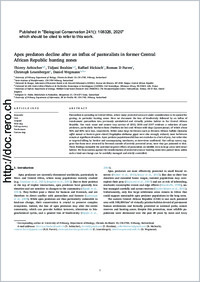Apex predators decline after an influx of pastoralists in former Central African Republic hunting zones
- Aebischer, Thierry University of Fribourg, Department of Biology, Chemin du Musée 10, CH-1700, Fribourg, Switzerland - Swiss Institute of Bioinformatics, CH-1700 Fribourg, Switzerland
- Ibrahim, Tidjani Université de Bangui, Laboratoire d'Economie Rurale et de Sécurité Alimentaire (LERSA), Avenue des Martyrs, BP-1450, Bangui, Central African Republic - Université de Lille Centre Lillois d'Etudes et de Recherches Economique et Sociologiques (CLERSE), Cité Scientifique, Villeneuve d'Ascq, FR-59655, Lille, France
- Hickisch, Raffael University of Oxford, Department of Zoology, Wildlife Conservation Research Unit (WildCRU), The Recanati-Kaplan Centre, TubneyHouse, Tubney, OX13 5QL, United Kingdom
- Furrer, Roman D. Kollegium St. Fidelis, Mittelschule in Nidwalden, Mürgstrasse 21, CH-6371 Stans, Switzerland
- Leuenberger, Christoph University of Fribourg, Department of Informatics, Bd de Pérolles 90, CH-1700, Fribourg, Switzerland
- Wegmann, Daniel University of Fribourg, Department of Biology, Chemin du Musée 10, CH-1700, Fribourg, Switzerland - Swiss Institute of Bioinformatics, CH-1700 Fribourg, Switzerland
-
2020
Published in:
- Biological Conservation. - 2020, vol. 241, p. 108326
English
Pastoralism is spreading in Central Africa, where many protected areas are under consideration to be opened for grazing, in particular hunting zones. Here we document the loss of biodiversity followed by an influx of transhumant pastoralism into previously uninhabited and virtually pristine habitat in the Central African Republic. Our track count and camera trap surveys of 2012, 2016 and 2017 evidence a reduction of apex predators, particularly Northern lions (Panthera leo leo) and African wild dogs (Lycaon pictus), of which about 95% and 80% were lost, respectively. While some large herbivores such as Western African buffalo (Syncerus caffer nanus) or Eastern giant eland (Tragelaphus derbianus gigas) were also strongly reduced, most herbivores remain at significant densities. Apex predator populations did thus not crash due to a lack of prey, but rather due to targeted killing by herders and accompanying merchants, as interviews confirmed. Our call-up survey suggests that lions were attracted by livestock outside of actively protected areas, were they got poisoned or shot. These findings exemplify the potential negative effects of pastoralism on wildlife even in large areas with intact habitat. We thus caution against the transformation of protected areas or hunting zones into pasture land, unless such a land-use change can be carefully managed and strictly controlled.
- Faculty
- Faculté des sciences et de médecine
- Department
- Département de Biologie
- Language
-
- English
- Classification
- Biological sciences
- License
-
License undefined
- Identifiers
-
- RERO DOC 328409
- DOI 10.1016/j.biocon.2019.108326
- Persistent URL
- https://folia.unifr.ch/unifr/documents/308469
Statistics
Document views: 145
File downloads:
- pdf: 1783
